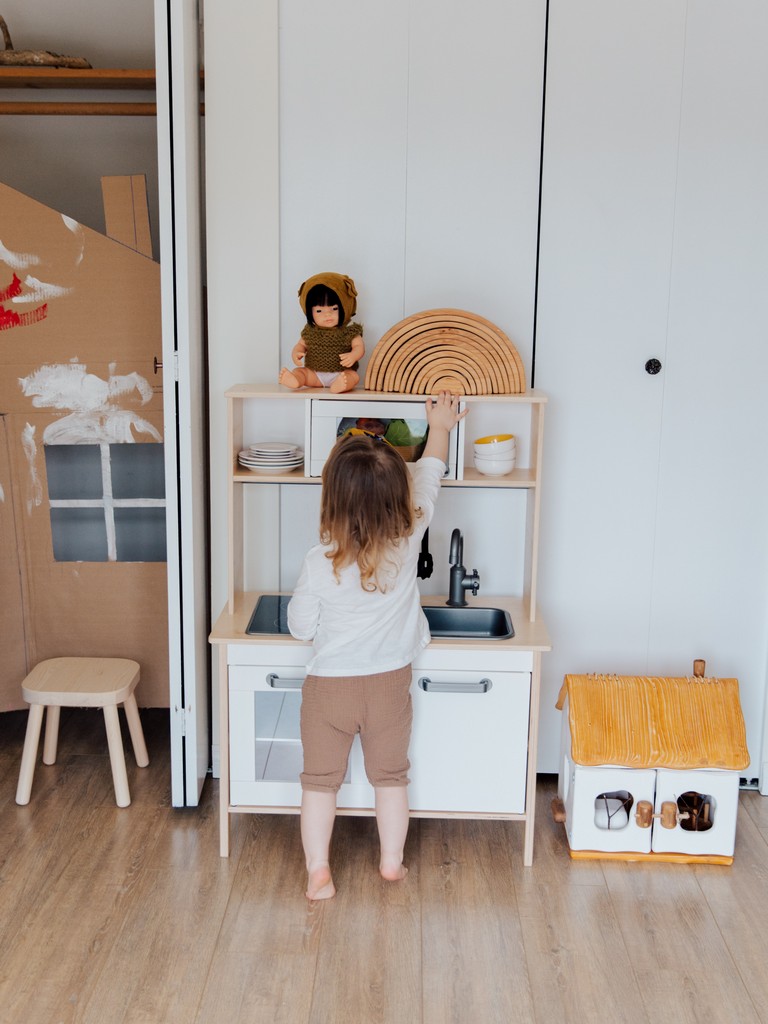Do Montessori Education Provide Adequate Socialization for Child?
Do Montessori Education Provide Adequate Socialization for Child? Yes, Montessori education provides adequate socialization for children. Montessori schools emphasize collaboration, communication, and respect for others. Children are encouraged to work together in small groups and learn to share, take turns, and resolve conflicts peacefully. The mixed-age classrooms also provide opportunities for younger children to learn from older children and vice versa. Additionally, Montessori schools often have a strong sense of community and encourage parent involvement, which further supports socialization and a sense of belonging for children.
Encouraging Creative Expression in Montessori Education
Creative expression is an essential part of Montessori education, and it is encouraged in various ways. Here are some examples:
1. Artistic activities: Montessori schools provide opportunities for children to express themselves creatively through various artistic activities like painting, drawing, sculpting, and more. Children are encouraged to explore different materials and techniques to express their ideas and emotions.
2. Music and movement: Montessori schools often incorporate music and movement activities into the curriculum. Children are encouraged to dance, sing, and play musical instruments to express themselves creatively.
3. Role-playing: Montessori schools often have dramatic play areas where children can engage in role-playing activities. This provides children with opportunities to express themselves creatively as they take on different roles and explore different scenarios.
4. Outdoor activities: Montessori schools also provide opportunities for children to explore nature and the outdoors. Children may engage in activities like gardening, outdoor art projects, and nature walks, which provide opportunities for creative expression.
Overall, Montessori education provides a conducive environment for children to express themselves.
Is Montessori Education Suitable for Shy Children?
Yes, Montessori education can be suitable for shy children. Montessori classrooms are designed to be child-centered and provide a supportive and nurturing environment, which can help shy children feel more comfortable and confident. Here are some ways in which Montessori education can benefit shy children:
1. Individualized learning: Montessori classrooms provide individualized learning opportunities that allow children to work at their own pace and focus on their strengths. This can help shy children build confidence as they develop their skills and knowledge.
2. Mixed-age classrooms: Montessori classrooms typically have mixed-age groups, which can help shy children feel more comfortable and confident as they interact with children of different ages. This can also help shy children develop social skills as they learn from older children.
3. Respect for individual differences: Montessori education emphasizes respect for individual differences, and teachers work to create a supportive and inclusive classroom environment. This can help shy children feel more accepted and valued, which can boost their self-esteem.
4. Hands-on learning: Montessori classrooms emphasize hands-on learning and active engagement, which can help shy children feel more comfortable and confident as they participate in learning activities. Children are encouraged to explore and learn through their senses, which can be a more comfortable and natural way for shy children to engage in learning.
Overall, Montessori education can be a great fit for shy children. The child-centered approach, mixed-age classrooms, and emphasis on individual differences and hands-on learning can help shy children develop confidence, social skills, and a love of learning. Additionally, Montessori classrooms often have a calm and peaceful atmosphere, which can be comforting for shy children who may feel overwhelmed or anxious in traditional classroom settings.
Waldorf vs Montessori Education: Which One Is Right for Your Child?
Choosing between Waldorf and Montessori education can be challenging, as both approaches have their strengths and can be effective for different children. Here are some key differences between Waldorf and Montessori education to help you make an informed decision:
1. Approach to learning: Waldorf education emphasizes creativity, imagination, and holistic learning, whereas Montessori education emphasizes hands-on learning, individualized instruction, and practical life skills.
2. Curriculum: Waldorf education focuses on a broad curriculum that includes art, music, and movement, as well as academic subjects. Montessori education focuses on activities that promote practical life skills, sensorial exploration, and academic learning.
3. Classroom design: Waldorf classrooms are designed to be warm, nurturing, and aesthetically pleasing, with natural materials and soft lighting. Montessori classrooms are designed to be practical and functional, with materials that are easily accessible to children.
4. Teacher training: Waldorf teachers receive specialized training in the Waldorf approach, which emphasizes the importance of the teacher’s role in nurturing the whole child. Montessori teachers receive specialized training in the Montessori approach, which emphasizes the importance of individualized instruction and the use of hands-on materials.
5. Age grouping: Waldorf education typically groups children in multi-age classrooms, whereas Montessori education groups children together by age.
6. Assessment: Waldorf education does not use traditional assessments or grades, instead focusing on the child’s progress and development. Montessori education uses a combination of observation, record-keeping, and assessments to track each child’s progress.
Ultimately, the choice between Waldorf and Montessori education will depend on your child’s needs, interests, and learning style, as well as your values and preferences. It can be helpful to visit schools, talk to teachers, and observe classrooms to get a better sense of which approach may be the best fit for your child.
How Montessori Education Can Cater to Your Child’s Interests?
Montessori education is a child-centered approach that emphasizes the importance of following the child’s interests and needs. Here are some ways that Montessori education can cater to your child’s interests:
1. Child-led learning:
In a Montessori classroom, children are encouraged to explore and learn at their own pace, following their interests and curiosities. The teacher acts as a guide, providing materials and activities that will support the child’s learning and development.
2. Hands-on materials:
Montessori education uses a wide variety of hands-on materials that are designed to be engaging and appealing to children. These materials allow children to explore and learn through touch, movement, and sensory experiences.
3. Individualized instruction:
Montessori teachers work closely with each child, observing their interests and abilities, and providing individualized instruction and support. This allows children to work at their own pace and level, and to pursue their interests and passions.
4. Integrated curriculum:
Montessori education integrates a wide variety of subjects and activities, allowing children to explore and learn holistically. For example, a child may learn about plants and gardening through a science lesson, and then use this knowledge to plant and care for a garden in the outdoor classroom. This kind of integrated learning helps children make connections between different subjects and concepts and encourages them to explore their interests in a meaningful way.
5. Freedom of choice:
In a Montessori classroom, children are given a great deal of freedom to choose their activities and materials. This helps children develop a sense of autonomy, responsibility, and self-direction. It also allows children to pursue their interests and passions, and to take ownership of their learning experience.
6. Multi-age classrooms:
Montessori classrooms typically have children of different ages working together. This allows older children to act as mentors and role models for younger children and gives younger children the opportunity to learn from and be inspired by older children. It also allows children to work at their level, rather than being limited by their age or grade level.
The Importance of Parental Involvement in Montessori Education
Parental involvement is an important aspect of Montessori education. Here are some reasons why:
1. Supporting learning at home: Montessori education emphasizes the importance of a child’s home environment in their learning and development. When parents are involved in their child’s education, they can learn about the Montessori approach and support their child’s learning at home.
2. Partnership with teachers: Montessori teachers work closely with parents to support each child’s learning and development. When parents are involved, they can provide information about their child’s interests, strengths, and challenges, which can help teachers tailor their instruction to the child’s needs.
3. Building community: Montessori education values community involvement and encourages parents to be active participants in their child’s education. When parents are involved, it helps to build a sense of community within the school and fosters positive relationships between parents, teachers, and students.
4. Feedback and communication: When parents are involved in their child’s education, they can provide feedback to the school and teachers about their child’s progress, and needs which helps to build trust and understanding between both parties.
5. Modeling positive behavior: When parents are involved in their child’s education, they can model positive behavior and attitudes toward learning. This can help children to develop a love of learning and a positive attitude toward school.
6. Advocating for their child: When parents are involved in their child’s education, they can advocate for their child’s needs and ensure that they are receiving the support they need to be successful in school. This includes advocating for special education services or accommodations if needed, as well as ensuring that their child’s learning needs are being met.
Overall, parental involvement in Montessori education is important for supporting each child’s learning and development, building community, and fostering positive relationships between parents, teachers, and students.

Meet Helen, a passionate educator and Montessori expert with over 15 years of experience in the field. She holds a Bachelor’s degree in Education and a Master’s degree in Montessori Education. Helen’s love for the Montessori method began when she was introduced to it during her own childhood education. Since then, she has dedicated her career to promoting the Montessori approach as a way to help children develop their full potential. Through her work as a teacher, consultant, and writer, Helen has helped countless parents and educators understand and implement the Montessori philosophy in their own lives. Her articles and books have been published in various education journals and she has been invited to speak at conferences around the world. Helen believes that every child has the potential to thrive and that Montessori education provides the tools to make that happen.

1 thought on “Do Montessori Education Provide Adequate Socialization for Child?”